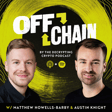Become a Creator today!Start creating today - Share your story with the world!
Start for free
00:00:00
00:00:01

CBDCs: What's Coming and Why Should You Care? (Part 1 of 2)
This is the first in a two-part series where Matt and Austin take a deep dive into central bank digital currencies (CBDCs). This episode focuses more on what CBDCs are, what they're capable of, and what their current rate of development progress is. Part two will go live next week where we dig more into the arguments for and against their use.
Transcript
Introduction and Episode Overview
00:00:12
Speaker
Hello and welcome to the Decrypting Crypto Podcast. It's September 5th, 2024, and this is Off Chain, your weekly recap of the biggest stories in the crypto space. I'm Matthew Housebarbie, and as always, I'm with Austin Knight. How are you doing, Austin? I'm holding up all right. It's been like a week under 60K. Not too happy about
Weather and Market Trends
00:00:33
Speaker
that. How are you doing, Matt?
00:00:35
Speaker
Oh, you know, sitting here in the, uh, in the, the beautiful British summer while I watch rain consistently fall down and a giant thunderstorm. So, you know, it's like, what is it in, uh, in literature, pathetic fallacy, uh, where the, the, the weather, uh, emulates the mood. Uh, so I think that's, you know, the weather is emulating the market, uh, in that respect. Well, uh, if I lived in the UK, I would probably think the market was always down. Yes, yes, that's very true. And it coincidentally, often is actually.
Central Bank Digital Currencies (CBDCs): An Introduction
00:01:11
Speaker
i But, you know, today we're not going to be talking a whole lot about the markets. Not that there's a whole lot to report outside of we're chopping sideways still. And what we are going to talk about is something that both you and I have a lot of strong opinions around, and that is CBDCs. And ah so for for those of you that are not so familiar, we're talking about central bank digital currencies. And in 10 years' time, I have absolutely no doubt that CBDCs are going to be a prominent part of everyone's lives, and we will not need to explain what a CBDC is, but
00:02:04
Speaker
I also believe in 10 years' time, it will be too late for any concerns to be raised around these, not to give a spoiler on my position on CBDCs. But what we want to do in this session is talk through what they actually are, you simple terms, their rate of development, what they can do, how they differ from regular currencies and also cryptocurrencies.
Global Relevance and Political Implications of CBDCs
00:02:33
Speaker
And why you should care and why this is important. And I think we're we're just going to kind of go through a bit of a free flow discussion and share both of our opinions, which may, may be different at times. And, uh, we'll, we'll break it down for everyone listening. I think it's worth noting if you're in the U S if you're in Europe.
00:02:54
Speaker
If you're in Asia, it doesn't matter where you are in this world right now, CBDCs are relevant to you even if you've never heard of them. It's something that if left ignored will become a very critical part of your daily life and it's all being shaped right now.
00:03:14
Speaker
It's a huge political issue. Maybe you've heard about it in the context of politics. We'll touch on some of that a little bit, but there's actually very interesting underlying tech that has those downstream implications that's not too complicated, but is worth understanding.
Understanding CBDCs vs. Traditional Currencies
00:03:30
Speaker
So let's get into it, Matt.
00:03:38
Speaker
Let's kick things off with just explaining what a central bank digital currency is. So I'm going to keep this as simple as possible. CBDC, it's a virtual currency, and it's issued directly by the central bank. So in the US, this case, the Fed, in the the EU, it'll be the the European Central Bank. You'll also have in like Britain, the Bank of England, et cetera, et cetera. It's often a digital variant version of the country's fiat currency, like pound sterling, euro dollar, and very importantly,
00:04:19
Speaker
While it is not designed to completely replace the overall like fiat currency, it is it is there to replace physical cash. Those notes and coins that we all used to use before the pandemic happened. ah Those things. Instead of printing physical money, that will stop. And I really believe that in More so, I believe this in the UK, that within a 10 to 15 year time horizon, physical cash will no longer exist. Well, will no longer be accepted. um So instead of printing physical money, the central bank issues digital currency to to residents, citizens. um And this is also a claim on the central bank. Now, I know you're thinking, thinking, well,
00:05:17
Speaker
Matt, we kind of we already have versions of digital cash, right? And that's what sits in our bank account. Everything's digital. Well, wrong. The cash sitting in your bank account is held and owned by your bank. That is not your money. The only time when it becomes your money is when you take it out and hold it as cash.
00:05:46
Speaker
Now, the unlike the money that is in your bank account, the the cash that you would have with, well, the CBDCs will be held in a digital wallet, much like you're used to with cryptocurrency.
Current Exploration of CBDCs Worldwide
00:06:04
Speaker
um And instead of being in your bank account, they'll be issued and and actually being like owned effectively but as the custodian ah that is your bank. They'll be issued directly by your central bank. Now, what is key here is to remember that while CBDCs can sound a lot like cryptocurrencies, may look like a cryptocurrency, may feel like a cryptocurrency, but it is not a cryptocurrency. They are completely centralized.
00:06:39
Speaker
and owned by the central bank. Governments will have a huge influence on them and will play a big role in them across many, many countries. So this is what this is. This is like, okay, you're going to have this digital wallet Central Bank will stop issuing physical cash. And instead, what you would have as physical cash will now be replaced by CBDCs. And I think for many people, they're like, and don't really use physical cash anymore. So I guess this isn't really a problem for me. Well, let's just pause that for, because there's a lot, lot more to it. But before we get into some of that,
00:07:23
Speaker
Austin, why don't we talk a little bit around, you know, where are CBDCs
Thailand's CBDC Stimulus Plan
00:07:28
Speaker
today? Like, are there those out there right now? Are they in development? What's the timeline look like on a lot of this stuff? Yeah. And it turns out there's a lot going on related to CBDCs all around the world.
00:07:41
Speaker
134 countries and currency unions representing roughly 98% of global GDP are currently exploring a CBDC. And in May of 2020, that number was only 35. So you can see the rate of acceleration that's happening around these.
00:08:00
Speaker
ah Currently, 68 countries are in the advanced phase of exploration, meaning they're in development, pilot, or launch. So this is happening at a rapid pace. There is a broad uptake on these.
00:08:15
Speaker
And, importantly, for the people that are mostly listening to this podcast, 19 of the group of 20 or G20 countries are now in the advanced stages of CBDC development. Of those, 11 countries are already in the pilot stage. This is happening. This includes Brazil, Japan, India, Australia, South Korea, South Africa, Russia, and Turkey.
00:08:42
Speaker
ah It's it's something that is so important to be aware of right now Not just understanding these these critical implications as you were mentioning Matt like the fact that this replaces physical money Which by the way to your point you may think I don't I don't carry physical money. It doesn't affect me That's not true at all Even if you don't carry physical money the presence of physical money and the lack of presence of a centrally controlled electronic currency by your government does have an impact on you to the point where you know i'm I'm reporting this podcast from Texas. It is a law in the state of Texas that no business can refuse to transact in cash. There are very good historical reasons for this. It does impact you and we can start to see
00:09:26
Speaker
how this will begin to play out ah you know through some of these more advanced examples that are happening right now. Remember, we said you you know this is something that would be controlled by your central bank, like the Bank of England or the Federal Reserve. Think about how how great the Federal Reserve has been managing things. How about now they manage everything to do with your money ever?
00:09:46
Speaker
We'll get into the implications of that. But one of the benefits of like this particular moment in time that we're in with CBDCs and that there's some countries that are in these advanced stages, others that are very early along, others that are resisting it, is that we have some examples that are starting to to come to light across the world. And there was this really interesting one that you were telling me about, Matt, with Thailand. what What's happening there?
00:10:12
Speaker
I think it's that that's there's a lot going on in in Thailand right now. And I think this is a great example of CBDCs in motion.
Physical Cash vs. Digital Currencies: A Post-Pandemic Perspective
00:10:23
Speaker
And we let's let's dig into some of this. But before before we go into that, I want to touch on like one of the pieces that you just mentioned there, Austin, around like cash. right Because i CBDCs in the past two to three years, post pandemic, have all of a sudden been just like this mass explosion of countries, central banks, piloting this, as you said, in that stat. um I can't remember exactly the stat you said, but I think it was like 130 countries now, and it was like 30, 35 in 2020. There's no coincidence.
00:11:01
Speaker
Right? So when you think about the perception around physical cash, how much the pandemic changed this, in in Norway, I was looking at some some data and Norway has kind of become the poster child of ah cashless society. I think last year, ah only 4% of the entirety of that the transactions in their economy came from cash, physical cash, which is like a global low by far. The US s actually has quite a relatively speaking high cash adoption, but the pandemic just crushed this, right? Because yeah in the UK, for example, you literally weren't allowed to use physical cash during during the pandemic. like it wasn't It wasn't allowed. and And that kind of made sense.
00:11:54
Speaker
And I think for for a lot of people, they they went a long time without using cash. And even now, unlike in places like Texas, where you cannot kind of um refuse to take the legal tender.
00:12:10
Speaker
it can be refused in the UK. So most of the time, it's very rare that places will just out of the gate like, well, actually, no, that's not and that's not true. It's not rare that places will accept cash. It's not uncommon that they won't, right? And The thing to remember about physical cash though, despite all of this, I i don't use physical cash. I can't remember the last time I touched a pound note. Really? Yeah, it was probably worth a hell of a lot more than it is today. I'll tell you that the last time. Did it feel heavier? Yeah, it probably did, yeah. It's probably made out of ah better quality material as well. um
00:12:52
Speaker
and the um and And I don't think that's a story that's uncommon in in Europe. So there is this desensitized kind of view of cash.
Stigma and Misconceptions Surrounding Cash and Crypto
00:13:05
Speaker
But what you cannot forget is that physical cash is the only form of money in your nation, like fiat currency, that you truly own. Yes. You truly own this. When it is in your hand, it is yours, you completely own it, and you have full autonomy to do what you want with it. That is key. And I think there's this cash has the similar narrative around it that crypto has.
00:13:43
Speaker
and and like the the early kind of rhetoric. Well, why do you yeah why do you need but do you need cash? like Are you doing something ah illegal? OK, let's get away from this stupid argument right that like cash it equals illegal, crypto equals illegal. um I think that is a rhetoric that is being pushed even more to bring in central bank digital currency. So i I want to touch on that. But let's talk about Thailand, because Thailand is fascinating, and this brings this whole thing to life.
00:14:17
Speaker
So why are we talking about Thailand? Thailand is about to distribute $12.5 billion dollars worth of stimulus to households in the nation. Yeah, let's go. Let's buy some let's buy some Bitcoin. um but Well, ah ironically, they won't be able to do that. And we'll talk about this now. So they they have a ah digital BART. BART is the the um fiat currency of Thailand.
00:14:41
Speaker
It's in its pilot phase, but they're going to that they're pushing out the stimulus payment to lower income families. And it was a part of like the the Thai government's election promise that has now ah come to fruition.
00:14:54
Speaker
And I think something like 50 million ah and Thai residents will basically meet this criteria to get stimulus. Individually, they'll get just under around about 300 bucks each. But that is like you know half of monthly per capita income, a sizable amount. It's kind of like the pandemic stimmy that people got across the US, for example.
00:15:22
Speaker
That sounds great. It's going to be distributed as CBDC. Who cares? Everyone has digital wallets, actually, over in Thailand already. It's kind of good to go. Isn't that a good thing, Matt? Well, let's it's open for debate. And just to be clear, there is a huge amount of misinformation about CBDCs, both on the negative aspects and the positive aspects. I think what we're going to try and do is cut across this and know that when I'm sharing an opinion, it's my opinion.
00:15:52
Speaker
but I want to just lay out some of the scenarios and you can make your own mind up. So here's something interesting around it. When the funds are distributed to you as a Thai resident that qualifies for this, they have to be spent within six months because CBDCs can be programmed to expire, for example. The idea here is that and this is a way to stimulate consumption as opposed to what would be kind of classes like leakage into savings. so One of the kind of criticisms fair criticisms around the pandemic stimulus in the US is people said, hey, this is supposed to stimulate the economy, but no one's no one's actually doing it because they haven't got anything to spend it on. so They just saved it, and it was an inflationary factor.
00:16:42
Speaker
now That's a cynical way to view stimulus in a very dire economic time. But there is truth to some of that. um Now, OK, so we've got that piece. The cash expires in six months. What are we going to spend it on? It's like, OK, how do we spend it?
Controlled Currency Systems: Ownership and Agency Concerns
00:17:03
Speaker
The problem, ah no, sorry, that's that's ah that's leading. that the The other element to this is that funds can only be spent at authorized small shops within a local area of a recipient. Also sounds pretty cool. How do you stimulate local spending in the local economy to ah to really kind of get um these local businesses that that need this growth and support up and running. Pretty pretty cool idea, pretty cool idea. um So that's that's also the case. The problem is, this is programmed into the money.
00:17:50
Speaker
This is money with a catch. And maybe, maybe that's not a bad thing in this very specific scenario. um But I think this is when we start to get into the debate, right? And ultimately, the fact is, if you want to benefit from the stimulus, you must use the CBDC. Very different to cash, right? Cash is optional.
00:18:17
Speaker
You must use the CBDC if you want to make use of it and you can only use it in a certain way and within a certain time. Exactly. And I think that's that really money at all. Yeah. Is that really your money or is it not? yeah um It's effectively not. If you don't have full ownership and agency over it and really agency, I think is the key. Right. Agency. When, when you talked about the fact that it has to be spent within six months,
00:18:46
Speaker
I think there are ways to rationalize that when you say it has to be spent in the local area of the recipient. I think there are also ways to rationalize that it it's not full agency over your money, but you could also say oh well this is money that I wouldn't have had otherwise even though effectively because that money is either created. through inflationary action or through taxation, it was money that was stolen by the government on your behalf from somebody else. We'll just ignore that. You could say, okay, ah six months, only in my local area, you know, those are acceptable terms. What is interesting to me and what I think is the most worrying word that you said in the last couple of minutes, Matt, is the word authorized, okay?
00:19:30
Speaker
that this money can only be spent at authorized small shops within the local area of the recipient. Now we're talking about extreme economic distortion and manipulation by a centralized body. What does authorized mean? What qualifies as being authorized? Potential, right. So I think to call out there, right.
00:19:51
Speaker
potential ah kind of potential mismanagement and and otherwise. so I think this is the piece in CBDCs that gets really interesting when you get into the debate because What we're, so if I just like, when I first heard this story and I heard, you know, there's a stimulus coming in for lower, low income households that really need it.
Potential Misuse and Power Dynamics of CBDCs
00:20:15
Speaker
And its focus is to drive consumption, provide a benefit to those households and support their local economy. And expiring on the funds, a kind of local,
00:20:31
Speaker
um set of authorized local businesses within a certain perimeter of where they are, I ah like that idea as a stimulus piece. The thing that kind of gets me here, right, and ah and and and it works really well if you imagine that the central bank and the government that make the decision around this key piece, authorized kind of small businesses. If you imagine that they are good actors, right? In the the notion that they are good actors, nothing seems too bad here. The problem here is that
00:21:14
Speaker
The decision around who can be authorized and who cannot be authorized holds an enormous amount of social and political weight that if you act as a bad actor, or even just simply like the power to do that you could argue is is bad enough. But and authorized might just mean
00:21:38
Speaker
companies that are registered as businesses in the in the local area. I don't know, just making stuff up, right? I'd be like, that's pretty good. And then you kind of rationalize it all with you're like, well, it's stimulus anyway, right? It wasn't ever really their money in the first place, you know, that this is kind of welfare, this is good.
00:21:56
Speaker
Now change, take this exact same scenario, but it's your salary.
00:22:02
Speaker
Your salary's come in and you get a portion of your salary paid in CBDC, portion of it goes into your bank account. Very valuable future. Your CBDC expires in X amount of months, say six months. You can only use it within a perimeter of X kilometers from your house from authorized businesses.
00:22:29
Speaker
Well, Matt, why would in it why would that ever happen? like They can't just do that with your salary. I agree. In normal times, maybe not. But what happens if you're in an extreme hyperinflation? And the government says, we're in extreme hyperinflation and we need to take on special measures. Happens all the time, right? like You just see it in different flavors. And they go, here's how we tackle this.
00:22:50
Speaker
We cannot afford to um have our citizens kind of like hoarding funds. ah We need economic activity. We need less disposable income, less savings that are going to produce an inflationary environment. We need to avoid ah kind of local businesses, like be it or or at least kind of this money just going wild across the place. We're going to expire it. It's going to focus on local economies and local businesses.
00:23:17
Speaker
this starts to get like, you know, the mind can wander a little bit on the the potential use cases here. and And why don't we, why don't we dig in a little bit? I think there's actually even more to be said on this.
Societal Control through Controlled Spending
00:23:30
Speaker
Oh, yeah. You know, the um I think you're very generous in your interpretation of this, you know, being potential, and your assumption that a government could ever be a good actor. I think that there will Even even in in the case of a government that is thriving or striving to be a good actor in the most genuine of ways, the ah the sheer weight of bureaucracy will ensure that even unintended consequences from central planning such as this will happen.
00:24:03
Speaker
ah um Historically, that's just like, it's, you know, we we see how how everything happened with the money printing that happened ah during COVID and all of the distortions. You can argue over whether or not that was intentional. You can't argue over whether or not that happened. And certainly the same thing would happen with this just at a much greater scale and at a much faster rate. And I do think that that word authorized is that's the scary piece. And it gets scarier to your point when when you're talking about your salary. But I don't think there's any nobility in not having agency over your currency, regardless of how you got that currency, even if
00:24:40
Speaker
It is stimulus. i would you know I would even go far as to say that this is paving the the way to potential human rights violations. And I'm not being hyperbolic here. When we use the word authorized, we have to consider the fact that an apartheid state existed in South Africa, a separate but equal system existed in the United States, that that That word, authorized, could be interpreted to mean ah spending at shops based on the the race of of who owns or operates that shop. It could be ah based on their political aff affiliation. It could be whether or not they ever had mean tweets in their history.
00:25:21
Speaker
um And that goes for the recipients as well. ah you know Moreover, we have policies today in the United States and the UK, so on and so forth, that are already based on race. for example you know And I don't mean to like just anchor on the race piece of this, but it's a particularly contentious thing.
00:25:41
Speaker
right now when it comes to monetary spending at the federal level, ah you know you have vendors that are given preferential treatment based off of the race or gender of the person that operates that that that vendor when it comes to federal contracts in the United States. These things already exist. What makes you think that this wouldn't happen with a stimulus like that can be totally controlled through a CBDC? I think that like you have to think about how this could potentially be taken to its malicious end from either side of the ah moral or political spectrum. What happened? I think that that's a fair a way to look at it. And I think what I really want to try and do when I think about this as well is play where where where I play the devil's advocate a bit on this is where we don't stray too much into the
00:26:39
Speaker
well, this can pave the way to X, right? Because I think that's really critical. But what I also look at when I see some of the critics of things like Bitcoin and actually physical cash, of it paving the way to enabling illicit activities from, you know, residents and otherwise, where, so I want to call out that because it's often a counter argument to this. And I think there's some reason to to that.
00:27:06
Speaker
But the individual agency of your own money right and committing illegal acts, there is a legal system to support and prevent that.
Risks of CBDC Use in Crises and Lack of Accountability
00:27:20
Speaker
When you look at this from the other way round, removing agency from the individual and placing out-weighted power on the government and the financial institution at large of like central banks, there is no one holding that to account. yeah right and and And there is no protection for the individual. And I don't even think it needs to go to like some of those extremes. I think it's critical that we consider the extremes.
00:27:53
Speaker
Even the, it's I think the real stuff, I think that in, in many Western countries, it will take certain circumstances for those kinds of things to play out, but it will be the tiny incremental pieces that go on. A hundred percent. And I think, you know, I read this fantastic article in the, the Financial Times, uh, that talked about Thailand's recent, um, kind of CBDC, um,
00:28:23
Speaker
kind of a rollout, right? And this stimulus ah piece. And the there was there was a great quote ah kind of within it that I am trying to to find as we... Oh, here it is, right? This this great piece, right? that the The piece in the Financial Times called Thailand May Tell Us a Great Deal About the Future of Money. And it's an op-ed and it says,
00:28:48
Speaker
It's not hard to envision a future in which CBDC usage is restricted to good citizens and acceptable expenditures as deemed by the government. And I think this is a critical piece because it's all subjective and it exerts enormous power. And I think that there's a lot of really intellectually interesting possibilities that come with CBDCs.
00:29:17
Speaker
And there is a enormous dark side to to a lot of these. I want to call out one. And that's, that's okay. Yeah. No, you go ahead. You go ahead. You go ahead. We can come back. There is, there is such thing as good trouble. Okay. Yeah. There's such thing as breaking ah the the law today.
00:29:37
Speaker
being wrong, but tomorrow it being noble, right? Because ultimately our legal system and our justice system is just an approximation of our collective morality or however you want to put
Loss of Financial Autonomy and Discrimination Risks
00:29:52
Speaker
it. An example that I would give that is like particularly relevant in the United States right now and to Texas, the state that I'm in, is abortions are illegal here, ye okay?
00:30:04
Speaker
i I could imagine ah it being like completely acceptable that you know if the state of Texas were to issue a CBDC, they would say this CBDC can only be used on things that are like lawfully allowed in the state of Texas, which means that now if your salary you know is coming through as a CBDC and you need to get an abortion,
00:30:27
Speaker
um um you're not going to be able to use your CBDC to to have that abortion, regardless of like whether it's you know under the table or in a different state or what have you. It's like that was issued here, you're not gonna be able to do that. These these implications effectively are downstream of this fact that with CBDCs, you'll have no choice but to use them, and the government will be in full control of how, when, where, and whether you can use your own earned money. And I don't think that that's like, you know, some like it's taken to its most extreme and interpretation of what a CBDC is, right? Like we we were giving these examples, but like example, I think would a hundred percent out of the gate exist, by the way, in the US.
00:31:18
Speaker
but i think I think it would just, I don't even doubt that at all. I don't think that would even be an escalation. I think in Texas, if there was CBDC there, they would not allow you to ah pay for abortion services with it. It would just, and when I say not allow, there's a different different piece here, right? To a legal precedent and literally your money won't work.
Negative Interest Rates and Economic Control
00:31:43
Speaker
It won't work.
00:31:44
Speaker
right that is the like That is the crux of of some of this. There's there's a piece that I want to build on this that I think shows what I was talking about before about something that's intellectually really interesting, but
00:32:06
Speaker
more than anything, hammer's home, what can truly be done. This is where a lot of pro-CBDC economists kind of get excited about CBDCs. And it's this notion of negative interest rates. And this is a pretty novel concept. And what ah I'm going to set the scene for the why and the what of this, and then we can talk talk to it a little bit.
00:32:33
Speaker
So if we look at what we've all been going through over the past couple of years, it's been rate hike, rate hike, rate hike, our central banks doing this in the US, the UK, the EU, pretty much wherever you're in the world, even the most like, even Japan has been as seen a rate hike, right? So you know you're in crazy territory now.
00:32:54
Speaker
and um What the the super dumb down reason for that is, is that you when you have high inflation happening, ah like the goods and services level, in particular goods,
00:33:11
Speaker
The price of goods is going up. People have disposable income. and Consumption is going up, i.e. people are spending more. and It's building this cycle of, okay, now um companies can charge more because demand is still there. Wages then have to be increased and people have even more disposable income. And the cycle continues upwards. How do you stop that? Well, you need to.
00:33:34
Speaker
Make people poorer is basically the TLDR. And how do you do that? You increase rates, and you increase interest rates right at the bank rate level, which has a knock-on effect into mortgage rates and et cetera, which means your debt gets larger, and your the cash that you own, not just physical cash, or all of your wealth,
00:33:58
Speaker
gets weaker, right? The cost of capital increases, which means you have less disposable income. You have to eat into savings. You spend less, and eventually there is less demand, wage growth slows, companies bring down prices, and then inflation sells. And then we all are really happy in a deep recession, right? And life continues back into the cycle. Now, instead of going, and it's kind of like a,
00:34:22
Speaker
um a Rube Goldberg machine of trying to make this happen, right? You've got like a million factors and it's why we have such a lag to eventually get to the stage where, you know, this has actually simmered down inflation. What you're trying to do is at the crux of it, central banks are trying to, like I said, make people poorer.
00:34:41
Speaker
Well, what if I told you there is this magical device called a CBDC and negative interest rates with the click of a button can make you all poorer. Well, that's how this happens. Instead of raising rates, negative interest rates actually will literally reduce the balance of your wallet. If you have $100 digital dollars,
00:35:10
Speaker
And there is a negative 5% interest rate. Well, guess what? Now you've got 95 digital dollars. so Boom. Done. Immediately. You're basically paying interest. you're You're paying interest by holding the currency effectively.
00:35:25
Speaker
Uh, I, I mean, it's, it's, this is one of those things where I feel like that would be like politically unworkable, except for in an authority, like a totally totalitarian authoritarian system, because like you'd never get elected again. If you know, inflation is invisible, right? Bear in mind, this is the central bank, not the government. ah yeah Well, well, so, so there is right. This admission, right? Why, you know,
00:35:53
Speaker
Uh, ultimately they are supposed to be church and state. And it is important though, to, to call that out that I think if the central bank decides to do this, they can do it.
00:36:07
Speaker
Right? And that's what they have agency. They have agency over these dollars, right? They are issuing them. They can do this. And actually, I do think that this will absolutely happen because if people are happy with rate increases and understanding eventually, like, you know, when you peel back the curtain of what's going on here and you just see the big glowing sign of you're getting poorer, right? And you realize, oh, shit, that's what's happening.
Eliminating Physical Cash for CBDC Implementation
00:36:35
Speaker
this isn't This isn't just like ah you know this like magical thing that's making everything better and the banks are just you know having to like, the government is like having more debt. It's like, oh, no, actually, like my my money's just worth less. But I still see 100 bucks in my account, so shit it doesn't actually mean it's less. This is just getting straight to the point and saying, like hey,
00:36:58
Speaker
we're just not even going to hide that you're getting poorer. And now you've got 95 bucks. So I think eventually this becomes a normal thing. The key with this is right you cannot have physical cash in in in a situation where negative interest rates happen because physical cash carries a 0% interest rate. So it has to overtake it. So I think that's a key thing to to consider.
00:37:26
Speaker
Yeah, it's it really is interesting. I mean, you know, I i almost, to be honest with you, Matt, um I almost would prefer this to just sort of standard inflation because I think that so many people, so many people that vote are, you know, not economically literate enough to understand, you know, the invisible tax or, you know, if you really want to be direct like the robbery,
00:37:53
Speaker
that is happening from them via inflation. And I understand that actually the logical endpoint that we're trying to get to with ah rate hikes and with quote, making people poorer is that the cost of goods and services and assets will go down. And then even though you have like, say, you know, less money,
00:38:16
Speaker
ah Because the cost of things is also lower, there's a better equilibrium. And maybe like in like real terms, in like your your actual you know felt quality of life, you wouldn't necessarily be poor, but you have to go through that painful process to get there. And it makes me think about you know the the fact that so often that process fails.
00:38:37
Speaker
And instead of like the cost of things going down, you just end up getting poor because like yeah so much is skimmed off the top or redistributed upwards through you know bureaucracy and through Wall Street, as we've talked about so many times um on this podcast. ah And it's not seen, even ah even if it's felt, it's like that little you know buzzing fly that you're like, groceries are more expensive.
00:39:01
Speaker
yeah It's not literally seen like in your bank account, but like going from $100 to $95 in your bank account. I actually think everybody can understand that. And what scares me is that as soon as this is proposed, as soon as something like this happens, which now we're saying it's possible.
00:39:20
Speaker
When historically it wasn't possible and I think that's the thing that's most important here is like we have these extrapolations that we're coming with up with taking these to their extreme ends that matters a lot less than than the fact that it's possible because it like opening the door and making it possible and The details of what actually happens in in the long run and how it all plays out are less important than the fact that it is possible and that that's the scary aspect of this. As as soon as as soon as the calculation is made to do something like this, to enact a negative interest rate, the the political calculation has also been made.
00:39:56
Speaker
that like this is something that you can do without the repercussion of not being like never being electable again, which means that either there is an extreme consolidation of power, which CBDCs help with, or that you know the general populace has accepted that they don't have agency over their own money and either of those to me I think have you know extreme implications for the way that but for your relationship with your money for your for for your own physical agency and for the way that our society is run yeah and i I completely agree you know it does get straight to the the point negative interest rates do but I think also this um this kind of piece around
00:40:48
Speaker
autonomy and control is the the overarching piece on this.
Impact on Lower-Income Individuals
00:40:53
Speaker
you know If a government, a central bank wants to um freeze all of your assets in your wallet, they can do it with the click of a button. If they determine you to be a bad actor, they can not just freeze, but take away all of your funds. If there is a strong enough political influence on this. Very easy to see that individuals and
00:41:22
Speaker
um ba sorry, companies that fit certain criteria can no longer receive funds, right? All of these things can can play out. And I think the key thing in all of this, right, is like, okay, do we want criminals that are really committing serious crimes, pedophile rings and all of this like human trafficking, do we want them to be able to receive money? No.
00:41:50
Speaker
Like, of course not. And if it stopped, would we be like, hooray? but Yeah. But the problem is that is such a small, small aspect of this. And i I'll go back to this piece, right, which is like in a perfect world free from corruption, CBDCs could absolutely, and actually, you know what, even outside of a perfect world, they they they can have their positive use cases.
00:42:19
Speaker
Like I say, like I don't think many people would want to let criminals conduct illicit activity. right yeah So that's generally good. right okay At the same time,
00:42:32
Speaker
It's so important that we do not live in a perfect, uncorruptible world. The level of power and control that governments, central banks would have over our money and that CBDs would bring would be unprecedented. And where I think this would truly be felt is during times of duress, right? I think, you know, you look at.
00:43:00
Speaker
economic duress, social duress. I think about times like, for example, ah the Arab Spring in um Egypt, ah the revolt against the government, the many attempts of coups. A coup happens a government could come in, seize control, obtain control over the the CBDC, and put daily spending caps on every single person in the country. They could freeze assets. We talk about Argentina, and we've talked about a lot of Latin America, Brazil, which you you know very well, right? And like even in ah China, capital control capital flight controls, not being able to send money out of the country and converting it to other countries.
00:43:44
Speaker
This is easy now with this. And yes, there will be more than just CBDCs that you will be able to have, right? You'll be able to have other ah cash alongside this, but I think there will come a growing, growing part. And more importantly, I think like in all things that exert power,
00:44:07
Speaker
unprecedented power over individuals, it will be those most in need of power that are hurt the most. Lower income individuals will most likely rely far more, as they do on physical cash, on CBDCs than wealthy people will.
00:44:28
Speaker
There will likely be spending caps, wallet max balances on most CBDCs that that come out. I know the UK, we talked about this way back when the UK first announced this, that there would be a £20,000 limit on how much you could hold in CBDCs. And that's for a really important reason, because it's trying to address another problem, which is um ah retail bank flight, our capital flight, sorry, from retail banks.
00:44:55
Speaker
so One of the big pieces here is like, okay, well, if people don't need to hold all their cash in a bank, could this like drain liquidity from the retail banking sector? It wasn't just what, last start last year when we had several large US banks collapse. You remember that due to liquidity issues. Well, and in times of crisis, which I just mentioned, most capital will move to the safest areas.
00:45:22
Speaker
in a time of like you know serious economic collapse, war, any any like major things, would you trust a retail bank or the central bank as the safest bet to hold your cash? Absolutely central bank. It's pretty much like categorically, we talk about T-bills as basically in the safest place to put your cash. That is central bank backed cash, right? you know So this is, or at least government um being lent by the central bank.
00:45:52
Speaker
So this capital could flow out of retail banks and flow into ah CBDCs. And again, further proliferate. I talked about that transition of the pandemic and this huge shift away from cash. This is another just pattern. And I think, you know, the potential to stop some of this happening is, yeah, you put caps on the wallet, anything over 20,000 that comes in, just slides straight into your retail bank, right, as an example.
00:46:18
Speaker
Will that be the case in all countries? Will that persist, or will this be the beginning of a transition into a fully CBDC kind of world, or at least a much, much larger influential? I don't know, but this for me is the the big piece in all of this, and I think it's... um It is worrying. And what I'm most worried about actually is the lack of wide discourse around this and knowledge about it from everyday people, because it's going to, it's going to come at us hard
Call for Public Discourse on CBDCs
00:46:51
Speaker
and fast. It reminds me a little bit around like, you know, the rise of social media and it's kind of like that thing that was just like all, you know, it's like harmless. And then it's like Cambridge Analytica scandal. And then we're like, what what the fuck just happened?
00:47:02
Speaker
right And now everyone is just like hooked into the matrix now. ah This will be 10x worse. Yeah. There needs to be more discussion and public discourse about this. And I also think that, you know to your point earlier, ah we need to be specific.
00:47:19
Speaker
about what the arguments for and against CBDCs are. And I think that, you know categorically speaking, there's probably a good handful of them, like four or five big categorical arguments that can be made. Now that we've spent the last episode here going through this intro into what CBDCs are, how they work,
00:47:42
Speaker
some of the potential downstream implications and our thoughts on that. Let's come back next week and get into specifics about these mechanisms behind CBDCs and what the arguments for and against them would be because there's so much to unpack there. And I think that is where it really starts to get interesting.
00:48:01
Speaker
100%, I'm looking forward to digging into it. All right, Austin, we'll wrap up this one, call it part one to be continued, and now we'll we'll dive into the rest next week. I'll see you then. That's great. See you then, Matt.
00:48:35
Speaker
The contents of the Decrypting Crypto podcast should not be used and are not intended as investment advice. Please do your own due diligence before making any investment, cryptocurrency or otherwise.
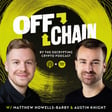
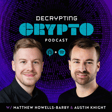
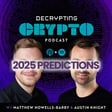
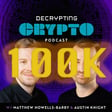
![CBDCs: The [Dark] Future of Money (Part 2 of 2) image](https://media.zencastr.com/cdn-cgi/image/width=112,quality=85/image-files/61fc0461fb20e00040aeb09e/5b9f1396-2a8e-418d-82a0-30fd00969266.jpg)





